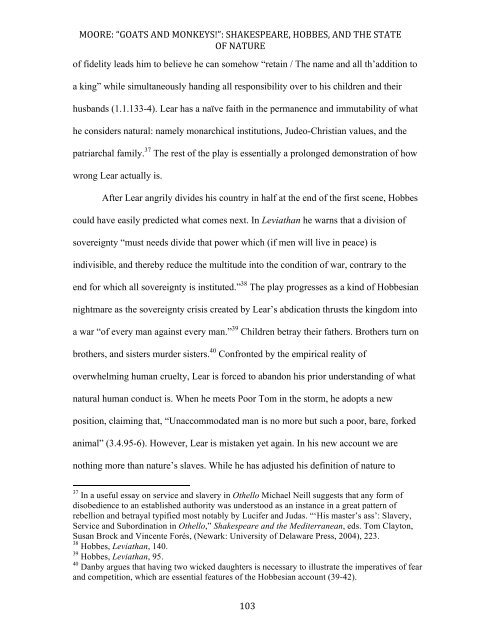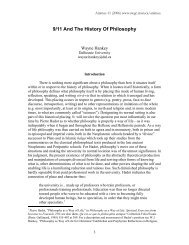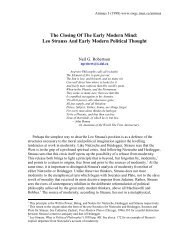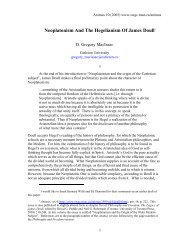âgoats and monkeys!â: shakespeare, hobbes, and the state of nature
âgoats and monkeys!â: shakespeare, hobbes, and the state of nature
âgoats and monkeys!â: shakespeare, hobbes, and the state of nature
Create successful ePaper yourself
Turn your PDF publications into a flip-book with our unique Google optimized e-Paper software.
MOORE: “GOATS AND MONKEYS!”: SHAKESPEARE, HOBBES, AND THE STATE <br />
OF NATURE <br />
<strong>of</strong> fidelity leads him to believe he can somehow “retain / The name <strong>and</strong> all th’addition to<br />
a king” while simultaneously h<strong>and</strong>ing all responsibility over to his children <strong>and</strong> <strong>the</strong>ir<br />
husb<strong>and</strong>s (1.1.133-4). Lear has a naïve faith in <strong>the</strong> permanence <strong>and</strong> immutability <strong>of</strong> what<br />
he considers natural: namely monarchical institutions, Judeo-Christian values, <strong>and</strong> <strong>the</strong><br />
patriarchal family. 37 The rest <strong>of</strong> <strong>the</strong> play is essentially a prolonged demonstration <strong>of</strong> how<br />
wrong Lear actually is.<br />
After Lear angrily divides his country in half at <strong>the</strong> end <strong>of</strong> <strong>the</strong> first scene, Hobbes<br />
could have easily predicted what comes next. In Leviathan he warns that a division <strong>of</strong><br />
sovereignty “must needs divide that power which (if men will live in peace) is<br />
indivisible, <strong>and</strong> <strong>the</strong>reby reduce <strong>the</strong> multitude into <strong>the</strong> condition <strong>of</strong> war, contrary to <strong>the</strong><br />
end for which all sovereignty is instituted.” 38 The play progresses as a kind <strong>of</strong> Hobbesian<br />
nightmare as <strong>the</strong> sovereignty crisis created by Lear’s abdication thrusts <strong>the</strong> kingdom into<br />
a war “<strong>of</strong> every man against every man.” 39 Children betray <strong>the</strong>ir fa<strong>the</strong>rs. Bro<strong>the</strong>rs turn on<br />
bro<strong>the</strong>rs, <strong>and</strong> sisters murder sisters. 40 Confronted by <strong>the</strong> empirical reality <strong>of</strong><br />
overwhelming human cruelty, Lear is forced to ab<strong>and</strong>on his prior underst<strong>and</strong>ing <strong>of</strong> what<br />
natural human conduct is. When he meets Poor Tom in <strong>the</strong> storm, he adopts a new<br />
position, claiming that, “Unaccommodated man is no more but such a poor, bare, forked<br />
animal” (3.4.95-6). However, Lear is mistaken yet again. In his new account we are<br />
nothing more than <strong>nature</strong>’s slaves. While he has adjusted his definition <strong>of</strong> <strong>nature</strong> to<br />
37 In a useful essay on service <strong>and</strong> slavery in O<strong>the</strong>llo Michael Neill suggests that any form <strong>of</strong><br />
disobedience to an established authority was understood as an instance in a great pattern <strong>of</strong><br />
rebellion <strong>and</strong> betrayal typified most notably by Lucifer <strong>and</strong> Judas. “‘His master’s ass’: Slavery,<br />
Service <strong>and</strong> Subordination in O<strong>the</strong>llo,” Shakespeare <strong>and</strong> <strong>the</strong> Mediterranean, eds. Tom Clayton,<br />
Susan Brock <strong>and</strong> Vincente Forés, (Newark: University <strong>of</strong> Delaware Press, 2004), 223.<br />
38 Hobbes, Leviathan, 140.<br />
39 Hobbes, Leviathan, 95.<br />
40 Danby argues that having two wicked daughters is necessary to illustrate <strong>the</strong> imperatives <strong>of</strong> fear<br />
<strong>and</strong> competition, which are essential features <strong>of</strong> <strong>the</strong> Hobbesian account (39-42).<br />
103
















